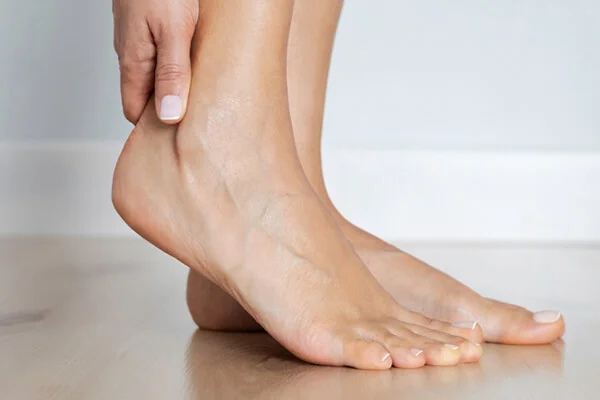Putting Your Feet First
Have you ever woken up full of energy, only to have that enthusiasm crushed by aching feet the moment they touch the ground? Or maybe you’ve had the frustrating experience of finishing a run, only to be greeted with a sharp pain in your heels instead of the exhilaration of accomplishment. Whether you’ve encountered one or both of these scenarios, it’s probable that you’re familiar with plantar fasciitis— even if you haven’t identified it as such.




What is Plantar Fasciitis?
Plantar fasciitis, a condition affecting the ligament connecting the heel bone to the ball of the foot, is a common cause of foot pain and discomfort in the lower limbs. It often occurs due to factors such as abnormal stresses running through the foot, most commonly by excess pronation or flat feet. If you have plantar fasciitis, you may feel pain that hinders your ability to walk or stand comfortably.
Coping with plantar fasciitis can present challenges, but it doesn’t have to severely limit your daily activities. If foot pain is affecting your ability to move comfortably, consulting with a podiatrist may provide valuable assistance.
Plantar Fasciitis Symptoms
Symptoms of plantar fasciitis may differ from person to person but generally include:
- Tenderness on the heel or arch
- Pain first thing in the morning when getting out of bed
- Pain after being seated for a while and standing up
- Sharp shooting pain getting worse throughout the day
- Pain in the arch of the foot
- Pain that worsens with activity such as walking and running
- Pain that worsens when pressing on the affected area




Causes of Plantar Fasciitis
The most common cause of plantar fasciitis is a tight plantar fascia, which may be brought on by:
- Muscle weakness
- Restricted joint range of motion
- Change of footwear or activity
- Foot posture treatment
Some other causes of plantar fasciitis include:
- Overpronation (where the foot rolls inward when walking or running)
- Flat feet
- High arches
- Performing repetitive activities such as walking, running, and dancing
- Tight calf muscles
- Tight Achilles tendon
- Improper footwear (lack of cushioning and/or improper arch support)
- Ageing
- Weight gain
Treatment for Plantar Fasciitis
Although plantar fasciitis can range from discomfort to intense pain, it is frequently treatable. Achieving recovery requires patience and dedication from both you and your podiatrist. If left untreated, plantar fasciitis may develop into a chronic condition, leading to complications such as chronic pain, heel spurs, and a decrease in overall quality of life.
At Talaria Podiatrist, we provide a diverse range of treatment options near Eaglemont tailored to your specific needs. Whether you’re a student or a senior, our objective is to improve your mobility while minimising pain. We recognise that everyone is different, and what works for one person may not be useful for another. Our experienced podiatrists will create a customised management plan for you, which may involve shockwave therapy, strapping, footwear guidance, stretching and strengthening exercises, orthotics, and needling. In rare cases, surgery may be considered for severe plantar fasciitis, although it is not commonly required.


Ready to experience comfort with each step and walk confidently in Eaglemont?
Your Plantar Fasciitis Questions Answered
Who can get plantar fasciitis?
Plantar fasciitis can potentially develop in anyone, but certain factors can heighten the risk. Individuals who participate in activities that place excessive stress on the feet, such as athletes, runners, dancers, or those with occupations requiring prolonged standing or walking, are particularly susceptible. Other risk factors include having flat feet or high arches, tight calf muscles or Achilles tendon, being overweight, and wearing ill-fitting shoes. Although plantar fasciitis can manifest at any age, it is most prevalent in middle-aged individuals, typically between 40 and 60 years old.
How is plantar fasciitis diagnosed?
Plantar fasciitis is typically diagnosed with a combination of your medical history and a physical examination. In some cases, imaging tests may also be required. If you’re concerned you may have plantar fasciitis, the first step is to see a podiatrist such as our team at Talaria Podiatrist so we can discuss your symptoms and examine and assess your feet.
What makes plantar fasciitis worse?
There are several factors that can contribute to worsening plantar fasciitis, such as prolonged standing or walking, engaging in high-impact activities, wearing inadequate footwear, and having tight muscles in the lower limbs.
Why does plantar fasciitis hurt more in the morning?
While you sleep, the inactivity causes your plantar fascia to contract and tighten. When you wake up and take your first steps, the sudden stretching of the plantar fascia may cause inflammation, resulting in pain during walking. If this is the case for you, performing stretching exercises in the morning may alleviate the discomfort.
How long does it take for plantar fasciitis treatment near Eaglemont to work?
The time required for treatment of plantar fasciitis varies depending on individual factors and the severity of the condition. Generally, the recovery process can range from several weeks to several months. It is vital to remain committed to your individualised treatment plan, as it is designed to guide you safely toward recovery.
What areas do you service?
- Alphington Plantar Fasciitis Treatment
- Brunswick Plantar Fasciitis Treatment
- Coburg Plantar Fasciitis Treatment
- Collingwood Plantar Fasciitis Treatment
- Fairfield Plantar Fasciitis Treatment
- Heidelberg Plantar Fasciitis Treatment
- Kew Plantar Fasciitis Treatment
- Northcote Plantar Fasciitis Treatment
- Preston Plantar Fasciitis Treatment
- Reservoir Plantar Fasciitis Treatment
- Rosanna Plantar Fasciitis Treatment
Why Talaria Podiatrist is the Team for Your Feet
Dedicated Team
Our team of podiatrists have been caring for Eaglemont feet since 2017, offering a wealth of education and experience in all things feet and nails.
Welcoming Environment
At our facility, we prioritise fostering a warm and friendly environment, and we strive to provide a personal touch to everyone who walks through our doors.
Local Care
Located in Thornbury, our clinic offers convenient accessibility to residents of both Thornbury and the neighbouring communities such as Eaglemont.


Get That Spring Back in Your Step
By taking the step to reach out to us, you’re opening the door to a future where foot pain doesn’t have to hold you back. We’ll work with you to address your concerns and find the treatment that suits you best, supporting you to achieve the best possible outcomes. Whether your goal is to take long walks, shoot hoops, or score points for your team, we’re here to assist you get there.
Let Us Care for You, Every Step of the Way
Our team of experienced podiatrists is dedicated to providing exceptional foot care and treatment for a wide range of conditions near Eaglemont, including plantar fasciitis. Whether you’re struggling with persistent foot pain or seeking preventive care, our team at Talaria Podiatrist is here to support you. Trust in our knowledge and skill, state-of-the-art facilities, and friendly, personalised approach to deliver solutions tailored to your unique needs. Don’t let foot pain hold you back any longer— contact Talaria Podiatrist today and take the first stride towards healthier, happier feet.
